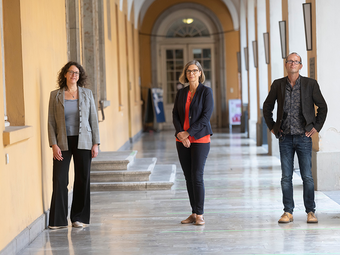Foundation of CESOC - Joint Centre for Earth System Observation in ABC/J region
Universities of Bonn and Cologne and the Research Center Jülich founded Center for Earth System Observation and Computational Analysis (CESOC)
This creates an internationally visible focus in the Rhineland to observe the Earth system globally, to understand it comprehensively and to predict changes.
 Das Direktorium des CESOC (v.l.): Prof. Dr. Astrid Kiendler-Scharr, Prof. Dr. Susanne Crewell und Prof. Dr. Jürgen Kusche.
Das Direktorium des CESOC (v.l.): Prof. Dr. Astrid Kiendler-Scharr, Prof. Dr. Susanne Crewell und Prof. Dr. Jürgen Kusche.
Copyright: Barbara Frommann
In times of global environmental change, it is important to deepen our knowledge of the many processes of the earth's climate system. A precise description of the interactions between atmosphere, ocean, ice, soil, vegetation and ultimately mankind is the prerequisite for improved weather and climate models. Observing the Earth plays a central role in this process, because if you do not observe comprehensively, you will not be able to make precise predictions.
This is where the Center for Earth Science Observations and Computational Analysis comes in. It brings together important core competencies at the three locations Bonn, Cologne and Jülich. The fields represented are meteorology, atmospheric chemistry, hydrology, climatology and paleoclimatology, soil sciences and near-surface geophysics, plant and agricultural sciences, geodesy, remote sensing, geoinformatics, mathematics, scientific computing and computer science. The two Faculties of Mathematics and Natural Sciences in Cologne and Bonn as well as the Faculty of Agriculture and two Transdisciplinary Research Departments of the University of Bonn are involved. At Forschungszentrum Jülich, institutes for energy and climate research, for bio- and geosciences and the Jülich Supercomputing Center are part of the new center.
The rectors of the two universities, the deans of the participating faculties and the Chairman of the Board of Directors of Forschungszentrum Jülich have now signed the cooperation agreement which seals the foundation of the new CESOC. Prof. Dr. Jürgen Kusche from the University of Bonn, Prof. Dr. Susanne Crewell from the University of Cologne and Prof. Dr. Astrid Kiendler-Scharr from Forschungszentrum Jülich have been appointed as founding directors. The CESOC office will be established at the University of Bonn.
At CESOC, research approaches are to be transdisciplinary in the future, emphasizes founding director Prof. Crewell: "In order to better understand weather and climate, we must not only look at the atmosphere, but at all adjacent areas such as soil, plants, ocean, etc., and understand how these interact with the atmosphere. Such processes are extremely complex, and their description by means of computer simulation represents a major challenge for science, emphasizes Prof. Kiendler-Scharr from Forschungszentrum Jülich: "In order to be able to describe the many interacting processes, we need mathematics, computer science, big data, optimization, data analysis, artificial intelligence and, last but not least, extremely powerful supercomputers such as those we have at Jülich. Progress in computer development will help us to overcome current simplifications and parameterizations in the models and open up the possibility of simulating processes according to their fundamental physical and chemical relationships.
Founding Director Prof. Kusche says: "Together, our three locations form a 'super competence center' of international appeal. We complement each other excellently in research, teaching and development. On this basis, we are an attractive partner for strategic alliances and joint top-level research. This would apply all the more if Germany were successful with its application for the European Centre for Medium-Range Weather Forecasting (ECMWF), which would then take its seat on the Rhine. State Secretary Dr. Tamara Zieschang from the Ministry of Transport and Digital Infrastructure, which is in charge of the application, explains: "With the European programs 'Copernicus' and 'digital Earth' we want to achieve a better understanding of our climate system. To this end, we have proposed Bonn as a location because it has the necessary high level of expertise and is ideally located in Europe. This gives us an excellent starting position for the decision of the member states in December 2020".
CESOC has an impact beyond the Rhineland metropolitan region, but also internally. It will promote excellent research and innovative methods as well as young scientists in the environmental and natural sciences and related fields. Lectures, workshops and conferences are intended to inspire the exchange of ideas. Also planned are joint study programs between the two participating universities.
Contact persons:
Prof. Jürgen Kusche
Institut für Geodäsie und Geoinformation (IGG)
Universität Bonn
Tel. +49 228 73-2629
E-Mail: kusche@uni-bonn.de
Prof. Susanne Crewell
Institut für Geophysik und Meteorologie (IGM)
Universität zu Köln
Tel. +49 221 470-5286
E-Mail: susanne.crewell@uni-koeln.de
Prof. Astrid Kiendler-Scharr
Institut für Energie- und Klimaforschung, Bereich Troposphäre (IEK-8)
Forschungszentrum Jülich
Tel. +49 2461 61-4185
E-Mail: a.kiendler-scharr@fz-juelich.de
Press contact:
Erhard Zeiss, Pressereferent
Forschungszentrum Jülich
Tel.: 02461 61-1841
E-Mail: e.zeiss@fz-juelich.de

